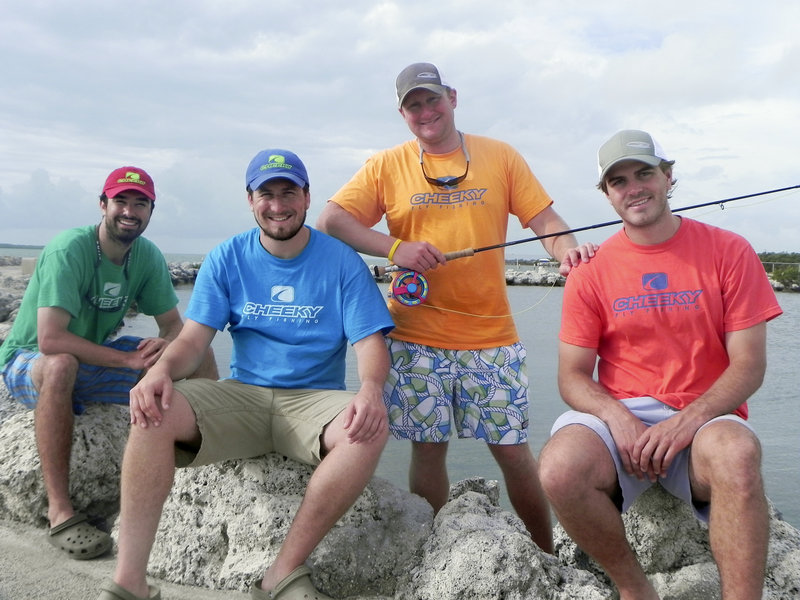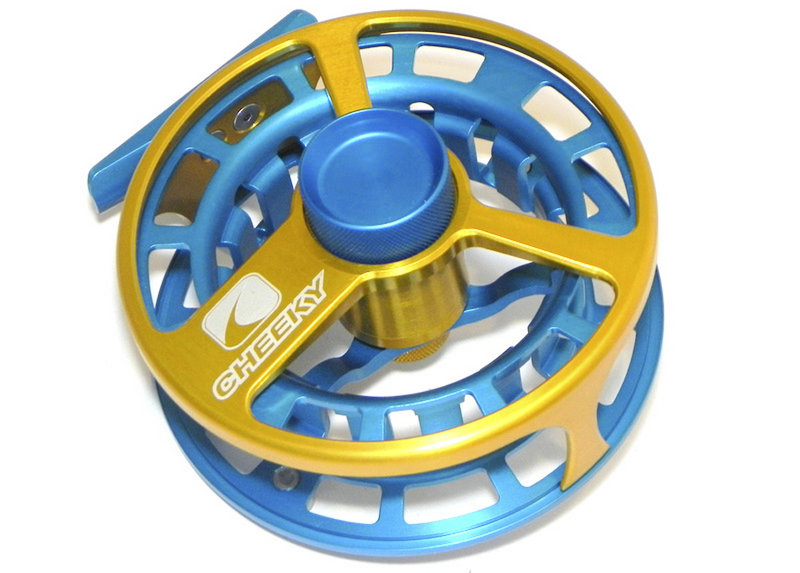Four entrepreneurs with Maine ties think fly-fishing needs a makeover.
They have launched Boston-based Cheeky Fly Fishing, a company that is trying to inject energy, excitement and youth into a sport that the owners say could use a dose of cool.
A few weeks ago, Cheeky began selling high-end fly-fishing reels designed to appeal to hip, urban anglers.
The company also sells a line of “swag” – branded hats, shirts, hoodies, beer coozies and other merchandise in striking, bright colors.
“You may know fly-fishing as a traditional and stuffy sport, but there is a growing demographic of progressive fly fishermen who are demanding different things,” said Ted Upton, 25, a Cape Elizabeth native who is a founding partner in Cheeky Fly Fishing. “We are trying to bring a lot of style to the sport.”
Upton started the company in 2009 with three partners: 26-year-old Cumberland native Peter Crommett, Scott Caras, 25, also from Cape Elizabeth, and Max Key, 25, from Denver.
Caras, Key and Upton all attended Bowdoin College; Crommett studied at Providence College.
Cheeky’s first reel, the Mojo 425, went on sale May 17 on Cheeky’s website, www. cheekyflyfishing.com. The $690 Mojo is designed for saltwater fish like striped bass, redfish and bonefish.
A freshwater model – the Ambush 375 – is expected to be on sale by August, followed by three more reels through 2012.
Two of them, the Thrash 475 and the Dozer 525, are designed for larger fish like tarpon, cobia, sharks and marlin.
Upton said Cheeky seeks to transform a traditional, family-oriented sport into one that’s more attractive to a younger, hipper crowd.
He sees the company’s customers as willing to travel the world in search of fishing adventures.
“(Fly-fishing) is shifting from a traditional sport to a trendy, urban sport,” he said. “We are not into the stuffy aspects of fly-fishing.”
Dana Eastman, owner of The Tackle Shop in Portland, said Cheeky’s reels are some of the nicest on the market.
But he said few of his customers spend so much money. He typically sells reels priced around $100, made by companies like Orvis and Redington.
The fly-fishing industry generated $658 million in sales in 2008, the last year the American Fly Fishing Trade Association published its industry survey.
Randi Swisher, president of the Louisville, Colo.-based group, said many fishermen will pay top dollar for the “very high-end” reels sold by Cheeky.
“There is a (demographic) in the fly-fishing world that likes super high-quality gear — people that are serious about their sport,” said Swisher.
Brickhouse Creative, based in Bozeman, Mont., helped design Cheeky’s logo, image and web page.
Brickhouse CEO David Thompson, who once worked for Orvis and has helped brand other fly-fishing companies, was struck by the vision and business acumen of Cheeky’s founders.
“They were not just a bunch of dudes who were like, ‘We are going to make some fly reels and have some fun.’ They had a PowerPoint (presentation) and a business plan and were obviously bright, energetic guys,” he said. “They had this vision that was fun and different and (were) aiming for an edgy, younger crowd.”
Upton said the ski industry went through similar changes about 20 years ago, when independent manufacturers hit the market and technology like parabolic skis and effective marketing attracted younger skiers.
“We often look to the ski industry for inspiration in marketing and branding,” said Upton. “Over time, (skiing) shifted to a sport that was much cooler, and a little bit more extreme.”
Thompson said other makers of fly-fishing equipment target the same young demographic. Upton said Orvis tends to appeal to an older crowd.
The website of the reel manufacturer Hatch says that company’s focus is on providing “the most stylish, high performance fly-fishing reels on the market today.”
“We were told anglers didn’t want so many color or style choices – they were wrong,” the site says.
Cheeky’s reels are made from lightweight materials like stainless steel, aluminum and titanium, and have drag systems made of carbon fiber, according to the website. The reels are made at the Custom Group machine shop in Woburn, Mass.
The partners left full-time jobs to launch the company. Key and Crommett worked at Wells Fargo and Boston’s Brown Brothers Harriman, respectively. Upton worked at the Mintz Levin law firm and a nonprofit philanthropic group; Caras was a consultant for Deloitte.
Upton said the company has been “self-funded” by the partners and operates with a “rigid budget.”
“We have bootstrapped ourselves and done a good job of using the resources we have,” he said.
He declined to disclose revenue, but said Cheeky earned “close to $10,000” on its second day of sales and is selling “several reels daily” to customers nationwide.
The company hopes to sell 8,000 to 10,000 reels yearly in five or six years.
When Upton and Caras were about 20, they helped launch Cape Catch in Cape Elizabeth, selling shirts, hats and tote bags with a lobster logo.
Upton said he and the Cheeky crew have fished most of their lives — across the United States and even in Russia.
“We wanted to be involved in an industry we were passionate about. We grew up as die-hard fly fishermen,” he said.
Staff Writer Jonathan Hemmerdinger can be contacted at 791-6316 or at: jhemmerdinger@mainetoday.com
Send questions/comments to the editors.



